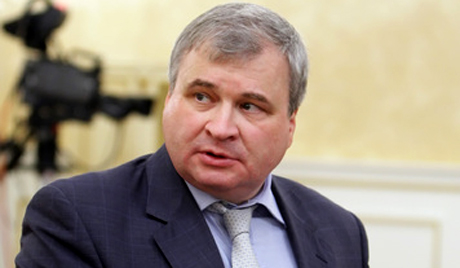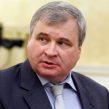
Moscow Ties “Reset” to Afghanistan
Publication: Eurasia Daily Monitor Volume: 7 Issue: 66
By:

On April 3, Russian Deputy Foreign Minister, Andrey Denisov, noted the generally positive change in the atmosphere between Moscow and Washington, but remarked that the relationship lacks “content.” The increased intensity in bilateral meetings, in his view, needs to be complemented by quality, rather than quantity. Denisov said that a partnership with the US on equal terms was impossible, so cooperation should reflect Russian interest in developing space research, nuclear power, missile and aircraft manufacturing and innovative technologies (RIA Novosti, April 3). In an extensive critique of the “reset” in US-Russian relations, Sergei Karaganov, the Chairman of the Moscow-based Presidium of the Council on Foreign and Defense Policy, also recently criticized the susceptibility of the formulation of NATO’s new strategic concept to pressure to push the Alliance in various directions. These range from developing an “Arctic NATO,” to an “Energy NATO,” aimed at countering a potential Russian threat. He suggested that the effort, however, for the Alliance to develop a role as a global policeman, has suffered a setback owing to its gradual “defeat” in Afghanistan (EDM, March 30; Rossiyskaya Gazeta, March 17).
US-led efforts to bolster the International Security Assistance Force (ISAF) mission to stabilize the country, is a longer term pivotal factor in US and NATO-Russian relations. Vladimir Yevseyev, a Senior Research Fellow in the Institute of World Economy and International Relations of the Russian Academy of Sciences, recently published an analysis of President Barack Obama’s Afghanistan strategy. He highlighted a number of “flaws,” which Russian analysts have identified in that strategy, as grounds for “significant correction” (Nezavisimoye Voyennoye Obozreniye, March 23).
Afghanistan’s President, Hamid Karzai, since 2007, has pursued a policy of negotiation with the Taliban movement, despite the weakness of the central government and its evident corruption. In this context, pursuing talks with “moderate Taliban” which the author considered an absurd term, risks facilitating their return to power. The deployment of 30,000 additional US troops might increase the vulnerability of western forces to terrorism and fuel the full adoption of guerrilla warfare by insurgents. Operations launched against the Taliban in Helmand and Kandahar provinces during February, with advanced warning, had served to minimize coalition losses, but such victories may prove only superficial, faced with the future withdrawal of western forces. Moreover, the objective to reliably strengthen the Afghan-Pakistan border areas, Yevseyev suggested, is subject to the commitment of Pakistan’s security forces to engage fully in such joint ventures, since Islamabad continues to attach higher priority to Kashmir, where it spends more resources. He also argued that 2011 is too soon to expect the Afghan National Army (ANA) to begin the process of establishing control over its territory. That reflects its low combat capability and the fact that many of its personnel have Taliban relatives. In future, ANA units may side with the Taliban, along with their weapons and equipment (Nezavisimoye Voyennoye Obozreniye, March 23).
Equally, the international fund for peace support and reintegration, which is being established, lacks sufficient financial support. Former insurgents are consequently faced with a choice, either to return to the Taliban or become involved in drug trafficking which will pay around $300 per month, or accept $100 monthly for serving in the ANA. Massive unemployment levels, between 50 to 80 percent depending on the particular province, combined with government corruption (estimated to involve 23 percent of GDP spent annually in bribing bureaucrats) militate against their assimilation.
Significantly, the Obama strategy allegedly underestimates two potentially key players in Afghanistan: Iran and China. Iran, for instance, is currently building railroad infrastructure in the country, stretching eventually from Sangana to Herat, as well as becoming one of the main investors in Kabul. Afghan refugees live in Iran, and there are historic, cultural and economic ties between Iranians and local Tajiks and Khazars. Meanwhile, with its close security ties to Islamabad, Beijing could more actively exert diplomatic pressure on Pakistan as part of the wider stabilization efforts. Finally, the strategy’s failure, as seen from Moscow, for ISAF to adequately tackle the poppy trade, further undermines Russian confidence in the potential for its future success. Nonetheless, Moscow would like to see the mission in Afghanistan “succeed,” though there is no clarity on what might constitute “success.”
A recent TV program on the official state channel Rossiya 1, followed Viktor Ivanov, head of Russia’s Federal Drugs Control Service (FSKN), in Kabul. Ivanov emphasized the linkage between the drug trade and funding for the Taliban. The presenter referred to Russia facing drug smuggling from the country, through Central Asia, and characterized this as “weapons of mass destruction.” Both the presenter and Ivanov highlighted that Helmand province supplies 90 percent of the World’s opium, and interviewed Yury Krupnov, the head of the Development Movement and the Institute for Demography who likened US and British operations in Afghanistan to “Hollywood style” propaganda. The program ended with an appeal to prioritize combating the drug trade, and abandon the hunt for the “mystical” Osama bin Laden (Rossiya TV 1, April 3).
Tatyana Parkhalina, the Director of the Moscow-based Center for European Security, highlighted that despite the recent improvement in NATO-Russia relations, both have very different perceptions of security. “There is an asymmetry of expectations, that is, we interpret the same concept in different ways. We formulate some aspects in the same way, but we expect different actions from each other,” she asserted. This factor, for instance, helps to explain the differences in approach toward the Afghan drug trade. Afghanistan remains a crucial area of cooperation in US and NATO relations with Russia. However, the complexities and subtleties at play in this relationship leave no illusions in Moscow about how the Alliance will form its strategic concept: “Moscow considers that its main interest in the sphere of security is not to allow the further expansion of NATO into the post-Soviet zone. Article 5 on collective defense and the ‘open door policy’ will be in the new strategic concept of the Alliance. However, the issue about the acceptance of Georgia and Ukraine into NATO has been put on hold for the foreseeable future. NATO will not sacrifice relations with Russia in order to accept them into a Membership Action Plan. Russia is more important,” Parkhalina affirmed (Nezavisimoye Voyennoye Obozreniye, March 14).
Moscow wants concessions from Washington, particularly that the Alliance should abandon its “open door” commitment to Georgia and Ukraine, and considers that in order to maintain the “reset” and cooperation over Afghanistan as well as other issues, it has effectively achieved this. However, as much as Russian relations with the West are enmeshed in the future of Afghanistan, there is growing skepticism in Moscow concerning Obama’s Afghan strategy, as well as the meaning and momentum of the “reset.” Facing mid-term elections in November, and with the US Congress divided, there are limits on how much “content” Obama can inject into the “reset,” but Russian strategists are contemplating relations following the withdrawal from Afghanistan and a possible looming crisis in 2015 over Ballistic Missile Defense elements placed in Bulgaria and Romania.<iframe src=’https://www.jamestown.org/jamestown.org/inner_menu.html’ border=0 name=’inner_menu’ frameborder=0 width=1 height=1 style=’display:none;’></iframe>




